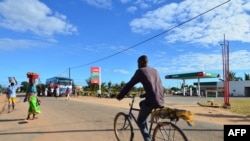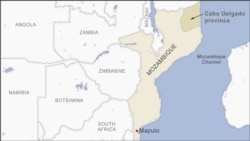President Filipe Nyusi addressed allegations that Mozambique's military is responsible for human rights abuses last week, saying, "True or not, this information should always deserve our attention with the utmost serenity and without emotions."
His comments came as the family of missing journalist Ibraimo Mbaruco wait for news of their relative.
Mbaruco was last heard from on April 7 when he messaged a colleague at Rádio Comunitária de Palma to say he was "surrounded by military." It was the last contact Mbaruco's friends and family had with him.
Rights organizations and Mbaruco's family say they suspect the journalist was forcibly taken by the military.
"Ibrahimo Mbaruco's apparent forced disappearance is of grave concern, particularly given the Mozambican security forces' alarming record of wrongfully detaining journalists," Dewa Mavhinga, southern Africa director of Human Rights Watch, said in a statement.
Mbaruco disappeared in the Palma district of Cabo Delgado, a relatively poor region that is home to large gas reserves and the scene of fighting between extremists and the military.
Companies including Exxon Mobil, ENI and Total are developing multibillion dollar gas projects in the region, but since 2017 militant attacks have killed at least 900 people.
However, rights groups and local journalists say the government forces that were brought in to respond to the violence often intimidate the media, including through arbitrary detentions.
The media watchdog Reporters Without Borders (RSF) said, "It is now virtually impossible to access the north of the country, the site of an Islamist insurrection, without risking arrest."
In the past three years, the military has arrested at least six journalists and confiscated equipment, Borges Nhamire, a researcher for the Mozambqiue non-profit Center for Public Integrity, who writes for international publications, told VOA.
Many reporters are "fearful to cover the war," Nhamire said. "What this kidnapping came to confirm is that for journalists, the army is more dangerous than the insurgents."
Since his April 7 text, "[Mbaruco] no longer answered the calls, although his phone continued to signal that he was still reachable," the press freedom organization Misa-Mozambique said.
Cabo Delgado police spokesperson Augusto Guta told VOA that Palma district police have been investigating Mbaruco's disappearance since his family reported him missing.
"We had no trace of Mbaruco," Guta said. "We contacted the army and other forces and they had no information about his presence in the police and military units."
VOA's calls to the spokesperson for Mozambique's Ministry of Defense went unanswered.
Other instances
Days after Mbaruco's disappearance, the military detained Hizdine Achá, a reporter for the independent television STV, for two hours.
At the time, Achá was covering police operations in Pemba, the capital of Cabo Delgado. Authorities ordered him to delete videos from his cell phone.
Other instances include the 2019 arrest of journalists Amade Abubacar and Germano Adriano, who were separately accused of "public incitement using electronic media" and "violation of state secrecy."
In Abubacar's case, the journalist was held incommunicado for 12 days and military officers allegedly violently shook the journalist, deprived him of food and kept him handcuffed even while he slept, according to rights groups including Amnesty International.
Both journalists were released on April 23, 2019, after pressure from national and international organizations. However, charges were not dropped and they remain under travel restrictions.
In another case, Estacio Valoi, an investigative reporter for the daily Zambeze, was arrested and held for two days in December 2018 while reporting on the impact of unrest in Cabo Delgado's population.
Call for transparency, answers
A group of Mozambican journalists earlier this month sent a letter to President Nyusi about Mbaraco's case.
The letter, viewed via messaging app by VOA, asked the president "to publicly explain to all elements of the defense and security forces that journalists are not part of the conflicts, so their work should never be subject to obstruction."
Mbaraco's brother Juma said he has had no further information from the authorities.
In previous cases, journalists detained by the military "were all released after being tortured, without formal charges and or any formal conclusion. And the authorities never provided explanation," Juma Mbaraco said.
"It is the same pattern in the case of Ibraimo Mbaraco," he said – although the whereabouts of Mbaraco are still unknown.





